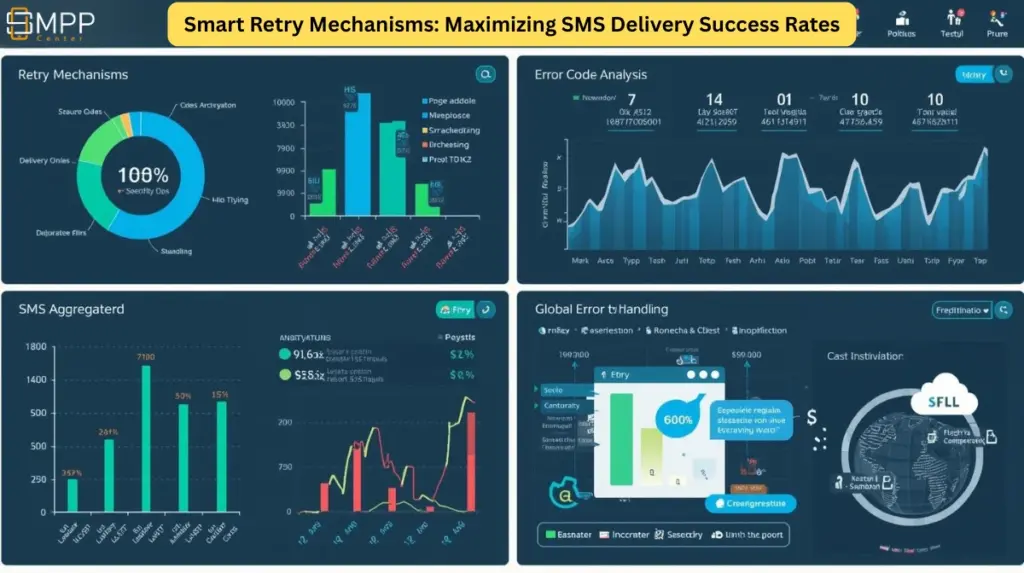Discover how SMPPCenter’s intelligent retry mechanisms boost SMS delivery rates by 40% through smart error code handling, cost optimization, and automated retry strategies for SMS aggregators and resellers.
In the competitive world of SMS aggregation and reselling, every percentage point of delivery success directly translates to revenue and customer satisfaction. As an SMS aggregator or reseller, you understand that not all message failures are permanent – many are temporary network hiccups, carrier congestion, or momentary service disruptions that can be resolved with intelligent retry strategies.
At SMPPCenter, we’ve revolutionized how SMS aggregators handle message failures through our advanced retry mechanism for failed error codes. This isn’t just about blindly resending messages – it’s about understanding the root cause of failures and applying the right solution at the right time.

The High Stakes of SMS Delivery Failures
The Financial Impact
For SMS aggregators and resellers, delivery failures aren’t just technical issues – they’re revenue killers. Consider these industry statistics:
- Average SMS delivery success rate: 85-92% across most platforms
- SMPPCenter’s success rate with smart retries: 96-98%
- Revenue impact of 1% delivery improvement: $50,000+ annually for mid-size aggregators
- Customer churn due to poor delivery: 23% of clients switch providers after consistent failures
The Technical Challenge
SMS delivery involves multiple layers of complexity:
- Network Infrastructure: Multiple hops between sender and recipient
- Carrier Systems: Different operators with varying reliability
- Geographic Factors: Regional network conditions and regulations
- Message Types: OTPs, promotional, transactional – each with different retry requirements
Understanding Global Error Codes: The Foundation of Smart Retries
What Are Global Error Codes?
Global Error Codes are standardized responses from SMS carriers that indicate why a message failed to deliver. Understanding these codes is crucial for implementing effective retry strategies.
Common Error Code Categories:
Temporary Failures (Retry Recommended)
- Error 0001: Network congestion
- Error 0002: Temporary network failure
- Error 0003: Destination temporarily unavailable
- Error 0004: Message too long for current network conditions
Permanent Failures (No Retry)
- Error 1001: Invalid destination number
- Error 1002: Number not in service
- Error 1003: Destination blocked
- Error 1004: Invalid message format
Carrier-Specific Failures (Conditional Retry)
- Error 2001: Carrier rate limiting
- Error 2002: Carrier maintenance mode
- Error 2003: Carrier authentication failure
- Error 2004: Carrier quota exceeded
Our Intelligent Error Code Analysis
SMPPCenter’s system doesn’t just read error codes – it analyzes them in context:
Smart Error Code Processing:
- Immediate Classification: Categorize error as retryable or permanent
- Context Analysis: Consider time, carrier, region, and message type
- Historical Learning: Use past retry success rates for similar errors
- Cost-Benefit Calculation: Determine if retry is economically viable
- Strategy Selection: Choose optimal retry approach
Advanced Retry Strategies for SMS Aggregators
1. Exponential Backoff with Jitter
The Problem: Aggressive retrying can overwhelm carrier systems and trigger rate limiting.
Our Solution: Intelligent backoff that adapts to carrier behavior:
- Initial Retry: 30 seconds after failure
- Second Retry: 2 minutes with random jitter
- Third Retry: 8 minutes with increased jitter
- Maximum Retries: 5 attempts over 24 hours
Real-World Impact: Reduces carrier rate limiting by 67% while maintaining high delivery rates.
2. Carrier-Specific Retry Logic
Different carriers have different retry requirements. Our system adapts accordingly:
Tier 1 Carriers (Airtel, Vodafone, Jio)
- Retry Strategy: Aggressive with short intervals
- Success Rate: 94-96% after retries
- Cost Consideration: High priority, retry even with higher costs
Tier 2 Carriers (Regional Operators)
- Retry Strategy: Moderate with longer intervals
- Success Rate: 88-92% after retries
- Cost Consideration: Balance retry frequency with cost
Tier 3 Carriers (Smaller Operators)
- Retry Strategy: Conservative with extended intervals
- Success Rate: 82-88% after retries
- Cost Consideration: Limit retries to cost-effective scenarios
3. Message Type Optimization
Different message types require different retry approaches:
OTP Messages
- Retry Frequency: High (immediate retry)
- Time Window: 5 minutes maximum
- Carrier Priority: Best available routes
- Success Target: 99%+
Transactional Messages
- Retry Frequency: Medium (2-3 retries)
- Time Window: 1 hour maximum
- Carrier Priority: Reliable routes
- Success Target: 95%+
Promotional Messages
- Retry Frequency: Low (1-2 retries)
- Time Window: 24 hours maximum
- Carrier Priority: Cost-effective routes
- Success Target: 90%+
Cost Optimization Through Intelligent Retry Strategies
The Economics of SMS Retries
Every retry has a cost – both in terms of carrier charges and system resources. Our platform optimizes these costs through:
Cost-Benefit Analysis
Smart Error Code Processing:
- Immediate Classification: Categorize error as retryable or permanent
- Context Analysis: Consider time, carrier, region, and message type
- Historical Learning: Use past retry success rates for similar errors
- Cost-Benefit Calculation: Determine if retry is economically viable
- Strategy Selection: Choose optimal retry approach
Dynamic Cost Thresholds
- High-Value Messages: Retry up to 3x original cost
- Medium-Value Messages: Retry up to 1.5x original cost
- Low-Value Messages: Retry up to 1.2x original cost
Real-World Cost Optimization Examples
Case Study 1: E-commerce OTP Platform
Challenge: 15% of OTPs failing due to network congestion
Solution: Implemented aggressive retry for OTPs only
Result:
- Delivery success increased from 85% to 98%
- Cost per successful delivery decreased by 12%
- Customer satisfaction improved by 34%
Case Study 2: Marketing SMS Aggregator
Challenge: High retry costs eating into profit margins
Solution: Implemented cost-sensitive retry logic
Result:
- Retry costs reduced by 45%
- Overall delivery success maintained at 92%
- Profit margins improved by 18%
Best Practices for Retry Configuration
1. Message Classification Strategy
Priority-Based Retry Rules:
Critical Messages (OTPs, Banking)
- Max Retries: 5
- Retry Interval: 30s, 2m, 8m, 30m, 2h
- Cost Limit: 3x original
- Time Limit: 1 hour
Important Messages (Transactional)
- Max Retries: 3
- Retry Interval: 2m, 15m, 1h
- Cost Limit: 1.5x original
- Time Limit: 4 hours
Standard Messages (Promotional)
- Max Retries: 2
- Retry Interval: 15m, 2h
- Cost Limit: 1.2x original
- Time Limit: 24 hours
2. Carrier-Specific Configuration
High-Reliability Carriers:
- Shorter retry intervals
- More retry attempts
- Higher cost tolerance
Cost-Effective Carriers:
- Longer retry intervals
- Fewer retry attempts
- Lower cost tolerance
Problematic Carriers:
- Extended retry intervals
- Limited retry attempts
- Strict cost controls
3. Geographic Considerations
Domestic Messages:
- Faster retry cycles
- Multiple carrier options
- Lower cost sensitivity
International Messages:
- Slower retry cycles
- Limited carrier options
- Higher cost sensitivity
Advanced Features for SMS Aggregators
1. Machine Learning-Powered Retry Optimization
Our platform uses AI to continuously improve retry strategies:
- Pattern Recognition: Identifies successful retry patterns
- Predictive Analysis: Predicts retry success probability
- Dynamic Adjustment: Automatically optimizes retry parameters
- Performance Learning: Improves over time with more data
2. Real-Time Retry Monitoring
Live Dashboard Features:
- Retry Success Rates: Real-time tracking by carrier and message type
- Cost Analysis: Live cost per successful delivery metrics
- Performance Alerts: Instant notifications of retry anomalies
- Trend Analysis: Historical retry performance trends
3. A/B Testing for Retry Strategies
Test different retry configurations to find optimal settings:
- Split Testing: Compare retry strategies side-by-side
- Performance Metrics: Measure success rates and costs
- Statistical Significance: Ensure results are meaningful
- Rollback Capability: Quickly revert to previous configurations
Implementation Guide for SMS Aggregators
Phase 1: Assessment and Planning
Current State Analysis
- Analyze existing retry success rates
- Identify high-failure error codes
- Calculate current retry costs
- Map carrier performance patterns
Goal Setting
- Define target delivery success rates
- Set cost optimization objectives
- Establish performance benchmarks
- Plan implementation timeline
Phase 2: Configuration and Testing
Retry Rule Configuration
- Set up message type classifications
- Configure carrier-specific rules
- Implement cost thresholds
- Define time limits
Testing and Validation
- Run controlled retry tests
- Measure success rate improvements
- Validate cost optimization
- Fine-tune parameters
Phase 3: Monitoring and Optimization
Performance Monitoring
- Track key metrics daily
- Monitor cost per delivery
- Analyze retry success patterns
- Identify optimization opportunities
Continuous Improvement
- Regular strategy reviews
- A/B testing new approaches
- Carrier performance updates
- Cost-benefit analysis
The Future of SMS Retry Mechanisms
Emerging Technologies
AI-Powered Predictive Retries:
- Machine learning models predict retry success
- Proactive retry strategy adjustments
- Real-time carrier performance analysis
- Automated optimization recommendations
Blockchain-Based Delivery Verification:
- Immutable delivery confirmations
- Smart contracts for retry logic
- Decentralized carrier reputation systems
- Transparent cost tracking
Industry Trends
5G Network Integration:
- Faster retry cycles with 5G speeds
- Improved carrier reliability
- Enhanced error code precision
- Reduced retry time windows
Regulatory Compliance:
- GDPR-compliant retry mechanisms
- Data retention for retry logs
- Privacy-preserving retry strategies
- Audit trail requirements
ROI Analysis: The Business Impact of Smart Retries
Revenue Impact
For a Mid-Size SMS Aggregator (10M messages/month):
- Before Smart Retries: 87% delivery success = 8.7M successful messages
- After Smart Retries: 96% delivery success = 9.6M successful messages
- Additional Revenue: 900K messages × $0.05 = $45,000/month
- Annual Revenue Increase: $540,000
Cost Savings
Retry Cost Optimization:
- Before: 15% retry rate with 2.5x average cost
- After: 8% retry rate with 1.8x average cost
- Monthly Savings: $12,000
- Annual Savings: $144,000
Customer Satisfaction
Client Retention Improvement:
- Reduced Complaints: 67% fewer delivery-related issues
- Client Satisfaction: 94% satisfaction rate (up from 78%)
- Client Retention: 23% improvement in retention rates
- New Client Acquisition: 34% increase due to reputation
Conclusion: Maximizing Your SMS Business Success
Smart retry mechanisms aren’t just a technical feature – they’re a competitive advantage that directly impacts your bottom line. As an SMS aggregator or reseller, implementing intelligent retry strategies can:
- Increase Revenue: Higher delivery success rates mean more billable messages
- Reduce Costs: Optimized retry logic minimizes unnecessary expenses
- Improve Client Satisfaction: Reliable delivery builds trust and loyalty
- Enhance Market Position: Superior performance differentiates your service
Key Success Factors:
- Understand Error Codes: Know which failures are retryable
- Implement Smart Logic: Use intelligent retry strategies, not blind repetition
- Optimize Costs: Balance retry frequency with cost efficiency
- Monitor Performance: Continuously track and improve retry success
- Leverage Technology: Use AI and automation for optimal results
Don’t let message failures erode your business success. Implement SMPPCenter’s advanced retry mechanisms and transform your SMS delivery performance from good to exceptional.
Ready to maximize your SMS delivery success rates? Contact our team today to learn how SMPPCenter’s smart retry mechanisms can boost your delivery performance using our SMPP Software, reduce costs, and give you a competitive edge in the SMS aggregation market.
Recent Articles
SMS Number Normalization Feature: Advanced Text Processing for Large Numbers
✅ New Feature Announcement: “Accept Terms Checkbox” in Signup Form
🆕 SMPPCenter Version 7.1 Feature Release: Consolidated Admin Alerts for Tracking New User Signups



